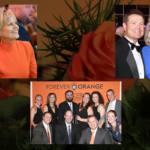Baker University recently received a $1 million grant from the National Science Foundation that will not only provide direct benefits to BU students and faculty but also brings the Baker experience full circle for several alumni leading schools in Baldwin City and the Kansas City area.
The Robert Noyce Teacher Scholarship Grant will provide students planning to become secondary educators in biology, chemistry, and mathematics a more streamlined curriculum and scholarship awards. It will also provide a powerful tool for recruiting future science, technology, engineering, and mathematics (STEM) educators to the university.
The benefits reach beyond Baker as well. As part of the ASTRA (Advancement of STEM Teaching and Retention Academy) Program, Baker is partnering with three neighboring school districts that will receive Noyce Scholars as student-teachers. Two of those districts—Grandview C-4 and Baldwin City USD 348—have leaders who are Baker alumni. The program also partners with Topeka Public Schools.
Through the Noyce grant, 24 Baker students will be awarded a scholarship of $11,000 during their junior and senior years as they tackle a demanding course load that culminates in a double major in education and a STEM field.
A Win-Win
The Noyce Scholars get vital experience teaching, and local high school students get fresh knowledge and perspectives from aspiring teachers learning the latest in STEM technologies and theory.
“The great thing about this program is that the emphasis is on STEM fields. There’s a shortage of teachers, especially in science. When they called me about this grant to help get more student-teachers involved in [STEM] programs, I was of course interested in supporting it. Hopefully, we’ll be able to hire these teachers,” said Kenny Rodrequez, ’17 EdD, superintendent of Grandview C-4 schools.
The choice of Grandview C-4 as a partner on the project went further than Rodrequez’s alumnus connection.
“It was interesting to reach out to Dr. Rodrequez to partner on this grant, because my first teaching job was in Grandview as a fifth-grade teacher, and I taught three sections of science and a language arts block. So, this opportunity to go back to where I began my career while supporting STEM education is awesome,” said Charlsie Prosser, ’11 EdD, Baker associate professor of education, chair of the Education Department, and project leader of the ASTRA Program.
Brant Brittingham, ’01, principal at Baldwin High School, earned a degree in biology from Baker. He says the Noyce grant will go a long way toward educating and preparing teachers in STEM at a different level.

“We need to get teachers well versed in methodology so they can go into classrooms and teach what the jobs entail,” he said. “These STEM teachers need to think like scientists, act like scientists. Getting teachers to get in an engineering mindset, think like what engineers do on the job, that’s important.”
Brittingham looks forward to hosting a student-teacher in math or science.
“[This partnership with Baker] lends itself naturally given the proximity of the two schools,” he said.
An important aspect of the Noyce grant is to create a more accessible route for students to become certified educators in a STEM field. Students must complete a double major in secondary education and a STEM-related field. Through the ASTRA Program, faculty will be able to develop more streamlined curriculum to fit in both STEM and education coursework.
“We want to make it easier for secondary teachers to teach STEM-related fields. This is really important because becoming a secondary educator in STEM fields is currently a tough road. It’s very hard to add the second major if you don’t do it as a freshman.”
Molly (Hunt) Anderson, ’ 99, assistant professor of laboratory instruction in Baker’s Department of Biology and Chemistry and an ASTRA project leader
In addition, the grant allows for a strong support system that includes mentoring that continues into the Noyce Scholar’s first year of teaching. Each scholar is assigned two Baker faculty advisors—one based in the STEM department and the other in the School of Education. Each partner high school district will recruit teachers to serve as mentors.
The program also addresses interview skills, grant writing, leading a STEM club, managing workplace stress, and conducting field research at the Baker University Wetlands. ASTRA graduates will be provided support to attend local, state, and national meetings to facilitate networking and continue to learn STEM best practices.
“The goal with this program is to make a network with incoming teachers. A network of people doing it, so our student-teachers have someplace to go. Baker has always been good at that—mentoring specifically for teachers,” Anderson said.
Grant funds also will be used for research into causes of attrition among early-career STEM teachers so that retention efforts can be made. And Noyce Scholars in science-educating fields receive financial incentives if they agree to work for two years at schools in need or schools in rural areas.
“The goal at the bottom line of all of this is to serve our communities,” Anderson said.
The first cohort of Noyce Scholars will begin the program next fall.







